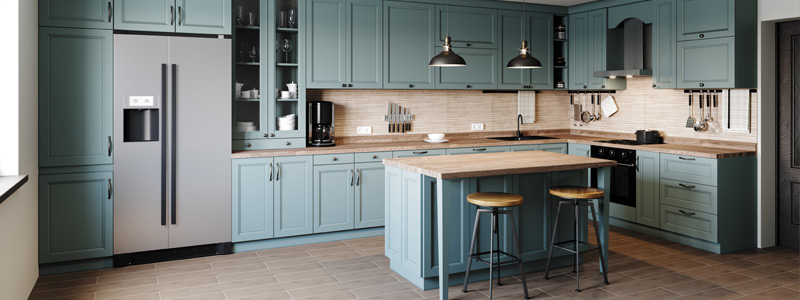What Are The Best Heat-Resistant Materials?

Do you spend a lot of time in the kitchen and need a countertop able to stand up against heat and other damaging factors? There are several different countertop materials available that provide exceptional resistance against heat, moisture, spills, and other various elements that can cause damage. Choosing these materials for your kitchen can help to make preparing meals easier, as you won’t have to worry about your countertop becoming damaged from hot pots or pans. Below you can find a compilation of the best heat-resistant materials for kitchen countertops, as well as recommendations for materials to avoid if heat is the main concern for you.
Granite:
One of the strongest and most heat-resistant countertop materials available on the market is granite! It is available in a variety of colors and natural stone designs, which makes it great for homeowners that are looking to add a pop of color or customization to their kitchens. Granite is able to withstand such high heat due to its formation technique, which involves a high heat process. One of the major benefits of choosing granite for its heat resistance is the ability to place hot pots and pans directly on the surface of the countertop without the worry of damage occurring.
Quartz:
Another strong material, quartz is also very heat resistant and is able to stand up against many damaging factors. The appearance of quartz is bright and elegant, which is a major appeal to homeowners looking to upgrade or modernize their kitchens. While quartz does have heat-resistant characteristics, it’s not recommended to place hot pots or pans directly on the surface. This may cause damage like warping or discoloration, so you should always use a hot plate or protective barrier between hot pans and the direct countertop surface.
Stainless Steel, Copper, Aluminum:
Another popular countertop material that is able to withstand heat is metal countertops, such as stainless steel and aluminum. It’s common to see these types of countertops not only in residential kitchens but also in professional kitchens like restaurants, hotels, and hospitals. While they are great at resisting heat, the surface may become discolored if hot items are placed directly on the countertop. This can be easily fixed with a metal cleaning solution or abrasive cleaner. Be sure not to place cold items directly on top of hot spots because the material retains what and this may lead to bacteria growth or food-borne illness.
Engineered Stone:
These countertops are unique in that they are composed of quartz crystals and a form of resin binder, which cures together to form a solid surface. The appearance of these countertops is quite similar to natural stone but possesses a different set of characteristics and advantages. They do possess some heat-resistant qualities and can stand up to many damaging elements, though it’s still recommended to use a hot pan or barrier between hot pans and the direct countertop surface. The main benefits of these countertops are the stunning and elegant visual appearance along with the strong, resistant surface that is comparable to other countertop materials.
Concrete:
Concrete is not only for outdoor surfaces like patios and driveways, this durable material can also be very functional as a countertop surface. The unique finish of this material can create a unique aesthetic in your kitchen, though the high costs for materials and installations may deter some homeowners. Concrete is very heat resistant and can withstand a lot of surface damage but pots and pans will still need a barrier such as a potholder before being placed directly on the countertop. If a hot pan is placed directly on the concrete, it can cause the sealant on the material to become discolored.
Avoid These Materials:
While there are several countertop materials that are able to withstand heat, there are some materials that you should avoid if this is a major concern for you. These materials each possess a unique set of benefits aside from being able to withstand heat. It is not recommended to choose a material like laminate, tile, and wood that are easily damaged and hard to keep clean. These materials are prone to showing surface marks and damages, which can affect the entire aesthetic and functionality of your kitchen.
Final Thoughts
It’s clear there are many countertop materials available that can provide exceptional protection not only against heat but also against many other damaging elements like spills, staining, and freezing temperatures. Each material comes with a unique set of characteristics and benefits, meaning the choice will be dependent on your personal preferences in the kitchen. If you have any questions concerning countertop materials or which will function best in your kitchen, reach out to a local company for assistance.
